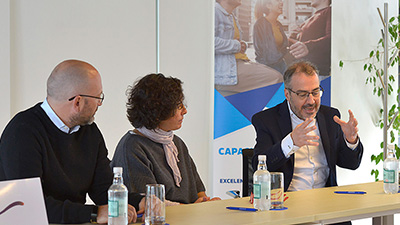With the vision that food heritage is a common transformation element for Chile, Peru, and Colombia, on Monday, September 26, the agreement between ISA INTERCHILE, Rondó Foundation, and the Center for Cultural Heritage of the Pontifical Catholic University of Chile was officially announced for the execution of the courses “Food Heritage and Local Development” and “Innovation and Creativity of Local Food Heritage,” which propose the transfer of tools for innovation from this heritage perspective.
Gabriel Melguizo, General Manager of ISA INTERCHILE; Loreto Carrizo, Founder and Executive Director of Rondó Foundation; and Umberto Bonomo, Director of the Center for Cultural Heritage UC, signed the agreement that will offer 15 scholarships to local managers, professionals, cooks, farmers, among others, from the different communities of Chile, Colombia, and Peru.
Gabriel Melguizo stated that the importance of this program lies in “recognizing the intangible heritage and basic products that unite Chile, Colombia, and Peru. This is in order to learn to value them and put them at the service of communities through entrepreneurship.”
Meanwhile, Loreto Carrizo expressed that for Rondó Foundation, “it is a beautiful milestone, which links us in person and allows us to project collaboratively in new challenges based on Food Heritage courses.”
It should be noted that the first version of these courses was in 2020, and according to what Umberto Bonomo indicated, “it is intended to generate capacities in territories around food heritage, understanding that it is a social, economic, cultural, and socio-environmental asset for communities.” In addition, the director of the UC Center for Cultural Heritage affirmed that the course to be implemented this time will address the relevance of agricultural economy.
The courses will start on October 19 of this year. For those interested in participating, there will be two types of scholarships, covering 70% and 100% of the courses, which will allow students to have support and accompaniment throughout the process.
Among the main objectives of this program is to analyze the importance of heritage in the economic and social development of territories, distinguish the main business models in the field of food heritage development, and apply creative methodologies to generate social innovation in territories, among others.
Based on this, the classes in both courses will cover topics related to the sustainable development of gastronomic heritage and food identity, as well as concepts related to entrepreneurship, innovation, creativity, leadership, technological development, circular economy, and sustainability.
The transfer of tools and the certification of capabilities are the focuses that inspire the implementation of the courses, as they aim to transform territories through their actors, who will add value to the food heritage.


